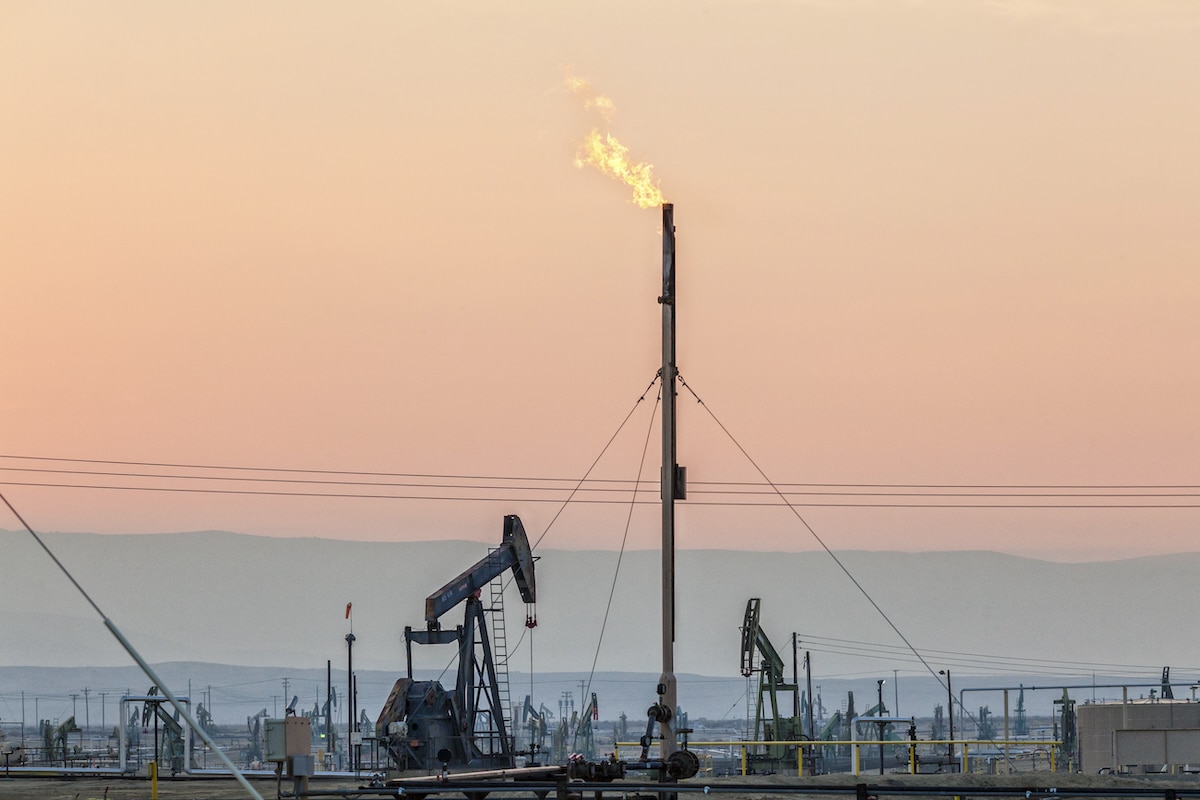Ecowatch
Biden Admin Takes ‘Long Overdue’ Steps to Limit Methane Emissions From Drilling on Public and Tribal Lands

Flares burning off gas at Belridge Oil Field and hydraulic fracking site in San Joaquin Valley, California in 2014. Citizens of the Planet / Education Images / Universal Images Group via Getty Images

Why you can trust us
Founded in 2005 as an Ohio-based environmental newspaper, EcoWatch is a digital platform dedicated to publishing quality, science-based content on environmental issues, causes, and solutions.
The United States Department of the Interior has announced a final rule to curb methane emissions from natural gas waste during oil and gas production on the country’s federal and Tribal lands.
The updated regulation modernizes rules that are more than four decades old. It will require oil and gas companies to stop wasteful practices, find and fix leaks and compensate Tribal mineral owners and taxpayers through the payment of royalties, a press release from the Interior Department said.
“This final rule, which updates 40-year-old regulations, furthers the Biden-Harris administration’s goals to prevent waste, protect our environment, and ensure a fair return to American taxpayers,” said Secretary of the Interior Deb Haaland in the press release. “By leveraging modern technology and best practices to reduce natural gas waste, we are taking long-overdue steps that will increase accountability for oil and gas operators and benefit energy communities now and for generations to come.”
It is expected that the final rule will generate additional royalty payments of more than $50 million annually from natural gas. At the same time, an enormous amount of gas — billions of cubic feet — that might have been flared, leaked or vented during oil and gas operations will be conserved. The conserved gas can then be used to power homes and industries across the country.
“This rule represents a common sense, fair, and equitable solution to preventing waste that provides a level playing field for all of our energy-producing communities,” said Tracy Stone-Manning, Bureau of Land Management (BLM) director, in the press release. “The BLM worked extensively with a wide range of stakeholders to modernize our decades-old regulations and help protect communities across the country.”
The development of oil and gas on public lands has expanded quickly since the 1980s. This growth has led to double the percentage of gas lost to venting and the burning of vented gas through flaring.
From 2010 to 2020, an average of roughly 44.2 billion cubic feet of natural gas was lost each year to venting and flaring, reported Tribal and federal onshore lessees — enough to power more than 675,000 residences.
Several states — including New Mexico, Wyoming, Colorado and Pennsylvania — as well as the U.S. Environmental Protection Agency (EPA) — have implemented measures to limit oil and gas venting, flaring and leaks in order to improve air quality or prevent waste.
The modernized BLM rule is different from the EPA rule. It ensures that oil and gas operators are able to comply with state, federal or Tribal rules while also meeting commonsense requirements.
“It requires operators of federal and Indian oil and gas leases to take reasonable steps to avoid natural gas waste from the very beginning of operations, carry out leak detection and repair across ongoing operations, and cut down on wasteful gas venting and flaring. Consistent with the Inflation Reduction Act, the rule also sets new limits on ‘royalty-free’ flaring, so that public and Tribal mineral owners are properly compensated through royalty payments for avoidable losses of natural gas,” the press release said.
Thousands of comments were received by BLM — from environmental groups, academics, landowners, oil and gas producers, industry experts and other stakeholders — that helped inform the proposed rule changes.
Environmental groups expressed support for the new policy.
“Taking action to limit methane waste on public lands offers a win-win-win for taxpayers, producers and communities harmed by this waste and associated pollution,” said Jon Goldstein, Environmental Defense Fund’s regulatory and legislative affairs senior director, as reported by Reuters.
Subscribe to get exclusive updates in our daily newsletter!
By signing up, you agree to the Terms of Use and Privacy Policy & to receive electronic communications from EcoWatch Media Group, which may include marketing promotions, advertisements and sponsored content.
Source
Disclaimer: No copyright infringement intended. All rights and credits reserved to respective owner(s).











